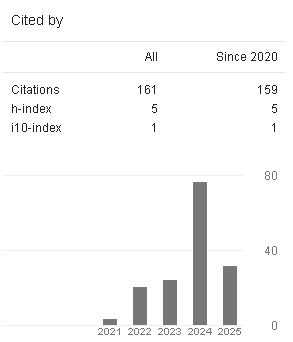Kepuasan Kerja: Perspektif Islam Terhadap Prestasi Organisasi
Job Satisfaction: An Islamic Perspective towards Organization Performance
Keywords:
Faktor;Kepuasan kerja, Perspektif Islam, Prestasi Organisasi, Factor;Job Satisfaction, Islamic Perspective, Organization PerformanceAbstract
Kepuasan kerja di kalangan pekerja dalam sesebuah organisasi sering kali hangat diperdebatkan di seluruh dunia. Konsep ini dibincangkan kerana ia memberi impak yang besar dalam pencapaian sesebuah organisasi. Kepuasan kerja telah melalui beberapa evolusi dari pelbagai sudut dan perspektif yang dihubungkan dengan perkembangan ilmu pengurusan hari ini. Oleh yang demikian, artikel ini membincangkan tentang kepuasan kerja yang secara langsung memberi impak terhadap pencapaian dan prestasi sesebuah organisasi. Pelbagai elemen yang mempengaruhi kepuasan kerja dibincangkan dari perspektif Islam. Kajian ini dilaksanakan secara kualitatif menggunakan kaedah temubual dan pemerhatian. Hasil daripada penelitian, kajian mendapati minat dan persekitaran kerja adalah faktor utama yang menyumbang kepada kepuasan kerja yang secara langsung memberi kesan terhadap pencapaian sesebuah organisasi terutama daripada perspektif Islam. Justeru itu, pemerkasaan terhadap faktor kepuasan kerja perlu diutamakan dalam usaha memastikan kejayaan yang seimbang antara kejayaan individu dan organisasi.
Job satisfaction among employees in an organization is often hotly debated around the world. This concept is discussed because it has a great impact on the achievements of an organization. Job satisfaction has gone through several evolutions from various angles and perspectives that are intertwined with the development of management science today. Therefore, this article discusses about job satisfaction that directly impacts the achievement and performance of an organization. Various elements that affect job satisfaction are discussed from an Islamic perspective. This study was carried out qualitatively using interview and observation methods. The results of the study found that interest and the work environment are the main factors that contribute to job satisfaction that directly affect the achievement of an organization, especially from an Islamic perspective. Therefore, empowerment of the job satisfaction factor needs to be prioritized as the effort to ensure balanced success between individual and organizational success.
Downloads
References
Amaliah, I., & Tasmara, A. (2015). The impact of the values of Islamic religiosity on Islamic job satisfaction in Tasikmalaya West Java, Indonesia, industrial centre. Procedia - Social and Behavioral Sciences, 211, 2–10. DOI: https://doi.org/10.1016/j.sbspro.2015.11.131
Aziri, B. (2011). Job Satisfaction: A literature review. Management Research and Practice, 3(4), 77-86.
Baah, K. & Amoako, G. K. (2011). Application of Frederick Herzberg’s Two-Factor Theory in Assessing and Understanding Employee Motivation at Work: A Ghanaian Perspective. European Journal of Business and Management, 3(9), 1-8.
Bacotic, D. & Babic, T. B. (2013). Relationship between Working Conditions and Job Satisfaction: The Case of Croatian Shipbuilding Company. International Journal of Business and Social Science, 4(2), 206-213.
Balakrishnan, A. (2011). Job Satisfaction: Literature Review. Management Research and Practice, 4(3), 77-86.
Carbonneau, N., Vallerand, R. J., Fernet, C., & Guay, F. (2008). The role of passion for teaching in intrapersonal and interpersonal outcomes. Journal of Educational Psychology, 100(4), 977–987. https://doi.org/10.1037/a0012545
Chandrasekar, K. (2011). Workplace Environment and its Impact on Organisational Performance in Public Sector Organisations. International Journal of Enterprise Computing and Busines Systems, 1(1), 1-19.
Christen, M., Iyer, G., & Soberman, D. (2006). Job satisfaction, job performance, and effort: A reexamination using agency theory. Journal of Marketing, 70(1), 137–150. https://doi.org/10.1509/jmkg.2006.70.1.137
Hashim, J. (2010). Human resource management practice on organisational commitment: The Islamic perspective. Personnel Review, 39(6), 78–799.
Howard, S., & Johnson, B. (2004). Resilient Teachers: Resisting Stress and Burnout. Social Psychology of Education, 7, 399-420. https://doi.org/10.1007/s11218-004-0975-0
Kaliski, B. S. (2007). Encyclopedia of business and finance (2nd ed., p. 446). Thompson Gale.
Khalid, S., & Zain, M. (2012). Job satisfaction among academic staff: A comparative analysis between public and private sector universities of Punjab, Pakistan. International Journal of Business and Management, 7(1), 126–138.
Khamlub, S., Harun-Or-Rashid, M., Sarker, M. A., Hirosawa, T., Outavong, P., & Sakamoto, J. (2013). Job satisfaction of health-care workers at health centers in Vientiane Capital and Bolikhamsai Province, Lao PDR. Nagoya journal of medical science, 75(3-4), 233–241.
Konstantinos, N. (2008). Factors influencing stress and job satisfaction of nurses working in psychiatric units. Health Science Journal, 2, 2–11.
Long, M. S. T. (2010). Secondary qualitative analysis: A valuable method for exploring sensitive issues with an elusive population. Journal of Research in Nursing, 16(1), 335–344.
Longacre, B. D. (2012). Acknowledging religious diversity: Opportunities and challenges. Economic Journal. https://doi.org/10.1016/j.bushor.2012.06.001
Manan, S. K., Kamaluddin, N., & Puteh Salin, A. S. A. (2013). Islamic work ethics and organizational commitment: Evidence from employees of banking institutions in Malaysia. Pertanika Journal of Social Sciences & Humanities, 21(4), 1471–1489.
Mihalič, T. (2008). Destination competitiveness applying different models: The case of Slovenia. Tourism Management, 29(1), 20–35.
https://doi.org/10.1016/j.tourman.2007.03.009
Miller, G. A., & Dingwall, D. G. (1990). Qualitative research. Journal of Research, 1(5), 235–244.
Moideenkutty, U., Blau, G., Kumar, R., & Nalakath, A. (2006). Comparing correlates of organizational citizenship versus in‐role behavior of sales representatives in India. International Journal of Commerce and Management, 16(2), 15-28.
Mullins, L. J. (2005). Management and organizational behaviour (7th ed.). FT Pitman.
Munir, R. I. S., Rahman, R. A., Malik, M., & Ma’mor, H. (2012). Relationship between transformational leadership and employees’ job satisfaction among academic staff. Procedia - Social and Behavioral Sciences, 65, 885–890.
Naharuddin, N., & Sadegi, M. (2013). Factors of workplace environment that affect employees’ performance: A case study of Miyazu Malaysia. International Journal of Independent Research and Studies, 2(2), 66–78.
Naharuddin, N., & Sadegi, M. (2013). Factors of workplace environment that affect employees’ performance: A case study of Miyazu Malaysia. International Journal of Independent Research and Studies, 2(2), 66–78. https://ssrn.com/abstract=2290214
Narayana, A. (2017). A critical review of organizational culture on employee performance. American Journal of Engineering and Technology Management, 2(5), 72–76.
Nathan, B. R., Mohrman, A. M., & Milliman, J. (1991). Interpersonal relations as a context for the effects of appraisal interviews on performance and satisfaction: A longitudinal study. Academy of Management Journal, 34(2), 352–369.
Shankar Pawar, B. (2009), Individual spirituality, workplace spirituality and work attitudes: An empirical test of direct and interaction effects. Leadership & Organization Development Journal, 30(8), pp759-777.
https://doi.org/10.1108/01437730911003911
Petrides, K. V., & Furnham, A. (2001). Trait emotional intelligence: Psychometric investigation. International Journal of Social Science and Humanity, 5(1), 120–125. https://doi.org/10.7763/IJSSH.2015.V5.436
Pua, L. C. (2008). Nurses’ job satisfaction in Malaysian private hospitals. Journal of Science, 1, 1–24.
Raheela, A. R. (2015). The impact of working environment on job satisfaction. Procedia Economics and Finance, 23, 3–15. https://doi.org/10.1016/S2212-5671(15)00524-9
Ramasodi, J. M. (2010). Factors influencing job satisfaction among healthcare professionals at South Rand Hospital. Health System Management, 201–310. http://hdl.handle.net/10386/214
Raziq, A., & Maulabakhsh, R. (2015). Impact of working environment on the job satisfaction. Procedia Economics and Finance, 23, 717–725.
Naharuddin, N. M., & Sadegi, M. (2013). Factors of Workplace Environment That Affect Employees Performance: A Case Study of Miyazu Malaysia. International Journal of Independent Research and Studies, 2, 66-78.
Salahudin, S. N. B., Alwi, M. N. R. B., & Baharuddin, S. S. B. (2016). The relationship between work ethics and job performance. Human Resource, 1–8.
https://doi.org/eISSN:2357-1330
Shahzadi, I., Javed, A., Pirzada, S., Nasreen, S., & Khanam, F. (2014). Impact of employee motivation on employee performance. European Journal of Business and Management, 6(23), 159–166.
Shravasti, R., & Bhola, S. (2015). Study on working environment and job satisfaction on employees in respect to service sector: An analysis. Monthly Multidisciplinary Research Journal, 4(4), 1–4.
Society for Human Resource Management. (2014). Employee job satisfaction and engagement. Journal of Human Resource, 1, 1–66.
Spell, J. M. (2004). Programme knowledge and value of work-family practices and organizational commitment. The International Journal of Human Resource Management, 5–25. https://doi.org/10.1080/09585190410001677304
Stringer, C. (2011). Motivation, Pay Satisfaction and Job Satisfaction of Front-Line Employees. Journal of Accounting and Management, 8(2), 161-179.
Thomas, J. R., & Nelson, J. K. (2014). Explore four methods for collecting qualitative research. Journal of Research, 2(10), 67–86.
Thomas, J. R., Nelson, J. K., & Silverman, S. J. (2014). Research methods in physical activity (7th ed.). Wiley.
Giri, V. N., & Kumar, B. P. (2010). Assessing the impact of organizational communication on job satisfaction and job performance. Psychological Studies, 55(2), 137–143. https://doi.org/10.1007/s12646-010-0013-6
Westover, J. H. (2012). Comparative international differences in intrinsic and extrinsic job quality characteristics and worker satisfaction, 1989–2005. International Journal of Business and Social Science, 3(7), 55–72.
Yousef, D. A. (2000). Organizational commitment as a mediator of relationship between Islamic work ethic and attitudes toward organizational change. Human Relations, 53(4), 513–537.
Yousef, D. A. (2001). Islamic work ethic: A moderator between organizational commitment and job satisfaction in a cross-cultural context. Personnel Review, 30(2), 152–169.
Zainudin, M. I., Fadzil, A. S. A., & Othman, A. K. (2018). Islamic working environment, organizational commitment, and employees job satisfaction.
Downloads
Published
How to Cite
Issue
Section
License
Copyright (c) 2022 RABBANICA - Journal of Revealed Knowledge

This work is licensed under a Creative Commons Attribution-NonCommercial 4.0 International License.












